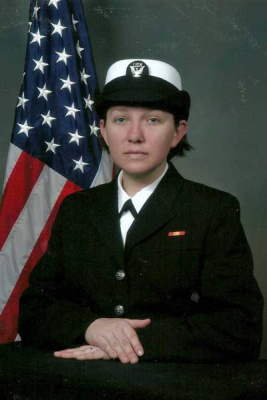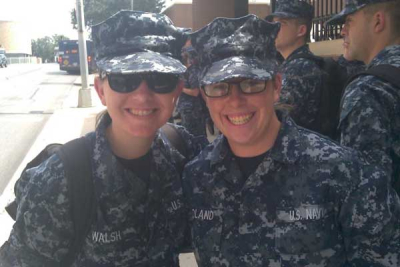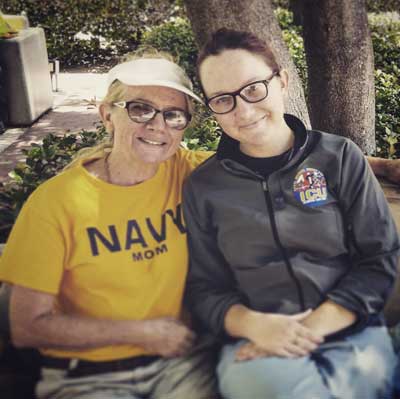I Couldn’t Fix the Problems From Inside. To Be Part of the Solution, I Had to Leave.
I turned off the patient’s ventilator and stood over him as his heart slowed and his breathing grew shallow. It was his own body killing him now—and he would die with none of his family there to witness his final breaths.
He was a stranger, but I felt connected to him.
Just outside the room, medical students strained to see the heart rhythm on the monitor above the ICU bed. Some had never watched a patient die, and, safely removed from it, they were hungry for his death. For me, it was just another day. Tomorrow could bring more death, or perhaps it wouldn’t. Even as a relatively new respiratory therapist in the Navy, I understood that life and death were part of the job I was trained to do.

Kirsten Laha-Walsh spent four years in the Navy as a respiratory therapist. Photo courtesy of the author.
The monitor flashed error messages as the patient’s heart slowed to a beat unmeasurable by the machines. His oxygen saturation was already around 30% and dropped quickly. Then he was gone. The medical students turned and left. The show was over. Now, I had to get back to work, removing the breathing tubes and clearing out the room.
I spent four years as a respiratory therapist in the Navy. I did not see combat. I still have nightmares, though. Some are about the patients I couldn’t save. This is the nature of the work. But the other nightmares—they are the lingering remnants of trauma brought on by the toxic leadership I experienced during my service.
I grew up a daughter and granddaughter of Navy veterans. As a young child, I waited excitedly for my father to arrive home from work each day. He’d always knock on the front door—a game we played—and I would knock back. We’d continue for several minutes until finally he flung open the door and greeted me. When he deployed, I waited at the door for a knock that wouldn’t come.
His father had served in the Navy during World War II. Though my family never pressured me to follow in their footsteps, military service was in my blood—an uncle who served in Vietnam, an aunt who served as a corpsman, and another uncle who joined the Navy Reserve.

I knew I had big shoes to fill, and I chose to enlist and intentionally pursue my path to petty officer. Despite serving two enlistments during wartime, I never deployed, and it remains one of my biggest regrets. I tried volunteering for respiratory therapist billets at the hospital in Kandahar Province, Afghanistan, and aboard the USNS Mercy, a naval hospital ship. The Navy instead shuffled me around a hospital that provided little opportunity for mentorship for those of us who walked the halls at night. Department lunches and picnics took priority over scaffolding support for lower-ranking sailors like me. It’s why I left the military—poor leadership, poor mentorship, and few opportunities to better myself as a service member.
Once, I asked for a week off for marksmanship training. I wanted to requalify with the hopes of getting a better medal. The request was denied. The department was understaffed, I was told, even as it appeared plush with civilian government service employees, contractors, and servicemembers on call-in duty. I never asked again.
I chose to go to graduate school while on active duty. I would continue working the night shift and complete my mandatory nine-month internship during the day. The schedule also allowed me to take my spouse, for whom I am a caregiver, to appointments when needed.
Award-Winning Journalism in Your Inbox
A few weeks before my internship began, I learned I was moving out of my department to the pediatric clinic to perform diagnostic testing in a newly created position for military respiratory therapists. Instead of working seven p.m. to seven a.m., I’d work seven a.m. to five p.m.—which would mean losing my internship and jeopardizing my degree. I explained the situation to my leadership, found a department member willing to switch places with me, and offered a solution. My direct leadership turned me down, so I continued up the chain of command. Until then, I’d had few encounters with higher leadership.
A chief I barely knew told me I needed to take one for the team and do as I was told. I told him that in addition to going to school, I was also the caretaker of my spouse, a Marine injured during Operation Iraqi Freedom. He said my spouse was no “wounded warrior.” Words are just words, of course, but this was a turning point—someone whose rank demanded respect showed me no respect.

Kirsten Laha-Walsh left the Navy after four years, believing she could better serve veterans outside the military. Photo courtesy of the author.
My request to switch shifts with my colleague was denied. I was unhappy in my role in the new clinic. The doctors, nurse practitioner, and another respiratory therapist did their best to show me kindness, but a lack of supportive military leadership tainted the whole experience.
I worked out an alternative with my new clinic that allowed me to keep my internship—at the expense of family time. I left home each morning at 5:15 a.m., began work at 7 a.m, and walked out the door by 3 p.m. to make my internship, which ended at 7:30 p.m. I spent my time behind the wheel on phone calls with my family or spouse, who worked overnight shifts and usually headed to work just as I got home.
Our marriage was tested, and essential things fell through the cracks, like health care appointments. Thankfully, we made it through and are a stronger couple today. But it was frustrating, made more so by the fact that the stress could have been prevented.
I put in a reasonable effort in my new clinic but the lack of good military leadership and mentorship for a handful of years weighed on me. Then one of my department colleagues overdosed on heroin laced with fentanyl. This too, I believed was preventable—a servicemember had reported my colleague’s use of nonprescribed opioids before the overdose. This was the final straw.
I knew I couldn’t fix the problems I’d encountered from the inside. I vowed to be a part of the solution for veterans—and that meant leaving the military.

Kirsten Laha-Walsh with her mother. Photo courtesy of the author.
Today, I try to be the leader and mentor I always wanted. It started with my education—I’m pursuing my Ph.D. in social work. I have focused much of my research on the military- and veteran-connected population, ranging from how they are represented in the media to how their drinking behaviors compare to civilians. My dissertation is on the psychosocial needs of caregivers of military veterans who identify as transgender, inspired by my family’s journey when my spouse came out as transgender.
I work with a nonprofit organization that supports veterans, and for the first time in my life, I enjoy going to work every day. I volunteer with veterans as much as possible, connecting them with the resources and programs they need. I’m part of communities that support one another. I want to help others avoid the negative experiences I went through.
Our Journalism Depends on Your Support
Despite the difficulties I faced in the military, some days I still wish I could put the uniform back on. I miss most the camaraderie and tradition, the adventure and gratitude felt by those I served with. But I think I have started to find that among my veteran neighbors.
One of the best lessons my naval service taught me is that a good leader trains their own replacement. A good leader is like a good teacher, one who wants their students not only to succeed but to surpass them. That’s what my service was missing. That’s what I strive to be.





Comments are closed.